| Srl | Item |
| 1 |
ID:
111278
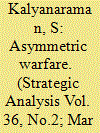

|
|
|
|
|
| Publication |
2012.
|
| Summary/Abstract |
Coined a few years ago, 'asymmetric warfare' is an umbrella term that includes insurgent and terrorist campaigns that Western militaries were forced to contend with in the course of external interventions. Asymmetric wars for Western countries are wars of choice, not wars of necessity.
|
|
|
|
|
|
|
|
|
|
|
|
|
|
|
|
| 2 |
ID:
020829
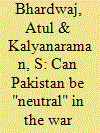

|
|
|
|
|
| Publication |
2002.
|
| Description |
170-173
|
|
|
|
|
|
|
|
|
|
|
|
|
|
|
|
| 3 |
ID:
056005
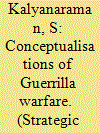

|
|
|
|
|
| Publication |
Apr-Jun 2003.
|
|
|
|
|
|
|
|
|
|
|
|
|
|
|
|
| 4 |
ID:
126088
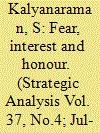

|
|
|
|
|
| Publication |
2013.
|
| Summary/Abstract |
Nearly 2,500 years ago the Greek historian Thucydides noted that the foreign policy of Athens was driven by fear, interest and honour. That these motives continue to drive policy even today is reflected in the three approaches most commonly employed in the study of international relations: realism and neo-realism, which emphasise the pursuit of power and security in an anarchical international system characterised by the security dilemma; liberalism and neo-liberalism, which highlight interdependence and the pursuit of economic interests; and institutionalism and constructivism, which stress upon identity and the quest for prestige and social recognition. 1 How does India's approach to its Asian neighbourhood fit within this three-dimensional framework of fear, interest and honour? That is the question which this commentary explores.
|
|
|
|
|
|
|
|
|
|
|
|
|
|
|
|
| 5 |
ID:
093286
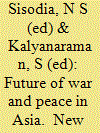

|
|
|
|
|
| Publication |
New Delhi, Magnum Books, 2010.
|
| Description |
viii, 400p.
|
| Standard Number |
9788187363972
|
|
|
|
|
|
|
|
|
|
|
|
Copies: C:2/I:0,R:0,Q:0
Circulation
| Accession# | Call# | Current Location | Status | Policy | Location |
| 054629 | 355.82511905/SIS 054629 | Main | On Shelf | General | |
| 054630 | 355.82511905/SIS 054630 | Main | On Shelf | General | |
|
|
|
|
| 6 |
ID:
099155
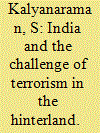

|
|
|
|
|
| Publication |
2010.
|
| Summary/Abstract |
Terrorism in the Indian hinterland is the result of a complex set of inter-related factors. The development of a jihad culture in Pakistan during the course of the Afghan conflict in the 1980s led to the subsequent Pakistani decision to employ jihad against India as a strategy. The mobilisation of the Hindu Right in India and ensuing communal violence led to the radicalisation of Muslim youth and the resort to terrorism by both Indian Islamists and Muslim criminal networks with help from Pakistan. Terrorist attacks by Pakistani jihadists and Indian Islamists, in turn, radicalised elements within the Hindu Right and set the stage for their turn towards terrorism in the last few years.
|
|
|
|
|
|
|
|
|
|
|
|
|
|
|
|
| 7 |
ID:
055771
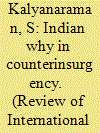

|
|
|
| 8 |
ID:
088498
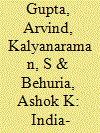

|
|
|
|
|
| Publication |
2009.
|
| Summary/Abstract |
India-Pakistan relations have been on a roller coaster. They reached a new low after
the Mumbai terror attacks of November 26, 2008. Tensions increased to such an
extent that the possibility of a war was openly talked about on both sides. However,
only a couple of hours before the attacks, the foreign ministers of the two countries
had appeared upbeat about the state of the peace process and the composite dialogue
which had started in January 2004.
The post-Mumbai situation brings to mind the Kargil episode of May 1999. A few
months before units of Pakistan's Northern Light Infanty were discovered in the icy
heights of Kargil, India and Pakistan were enjoying the honeymoon that had begun
with Prime Minister Vajpayee's visit to Lahore. Vajpayee's visit to Lahore, also
known as the Lahore Bus Yatra, was an attempt by the two sides to normalize the
bilateral relationship after the May 1998 nuclear weapons tests. Even as the Prime
Ministers of India and Pakistan were signing documents to normalize the relationship,
the Pakistan Army was planning intrusions into Indian territory. After the Pakistan
Army was forced to withdraw from the Kargil heights by Indian military operations
and international condemnation and pressure, the elected civilian government was
overthrown by the then Army Chief, General Parvez Musharraf, who ruled the
country for the next nine years.
|
|
|
|
|
|
|
|
|
|
|
|
|
|
|
|
| 9 |
ID:
187788
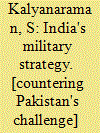

|
|
|
|
|
| Publication |
New Delhi, Bloomsbury India, 2023.
|
| Description |
x, 277p.hbk
|
| Standard Number |
9789356400023
|
|
|
|
|
|
|
|
|
|
|
|
Copies: C:1/I:1,R:0,Q:0
Circulation
| Accession# | Call# | Current Location | Status | Policy | Location | IssuedTo | DueOn |
| 060254 | 355.033054/KAL 060254 | Main | Issued | General | | RF096 | 03-Nov-2023 |
|
|
|
|
| 10 |
ID:
020826
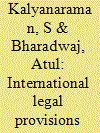

|
|
|
|
|
| Publication |
2002.
|
| Description |
153-158
|
|
|
|
|
|
|
|
|
|
|
|
|
|
|
|
| 11 |
ID:
115951
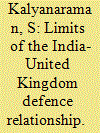

|
|
|
|
|
| Publication |
2013.
|
| Summary/Abstract |
The United Kingdom (UK) is keen on establishing a 'stronger, wider and deeper' relationship with India. It is 'determined to make' defence cooperation 'an essential part' of this relationship. London sees such a relationship with an India that will shape the twenty-first century as 'an essential pillar' in its 'broader strategy' to fashion a role for itself in Asia.
But how important is the UK for India's role in the emerging Asian landscape? Not very, it appears, from de rigueur statements about sharing 'the same vision for a renewed and enhanced partnership' and working together to address 'the challenges of global poverty and development, reform of global institutions, terrorism and climate change' as well as from appeals for a 'better appreciation of each other's core concerns including on the security environment' and particularly the challenge of terrorism.
|
|
|
|
|
|
|
|
|
|
|
|
|
|
|
|
| 12 |
ID:
114279
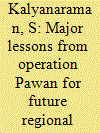

|
|
|
|
|
| Publication |
2012.
|
| Summary/Abstract |
The Indian intervention in Sri Lanka throws up five major lessons for future regional stability operations. Firstly, it is imperative to define the mission unambiguously and establish a clear mandate. Secondly, there is need for a robust military contingency planning process as well as discussions at various levels within the system to refine plans and provide an adequate force to meet possible eventualities. Thirdly, clear command and control needs to be established at the outset and the appropriate field formation must be designated as the headquarters. Fourthly, intelligence planning and coordination need to be made comprehensive, and adequate expertise and capabilities must be built up in advance. Finally, the importance of engaging in civil affairs tasks must be factored into the planning process, for which purpose the requisite data must be collated and plans formulated.
|
|
|
|
|
|
|
|
|
|
|
|
|
|
|
|
| 13 |
ID:
023148
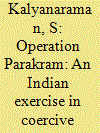

|
|
|
|
|
| Publication |
Oct-Dec 2002.
|
| Description |
478-492
|
|
|
|
|
|
|
|
|
|
|
|
|
|
|
|
| 14 |
ID:
007612
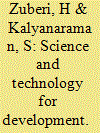

|
|
|
|
|
| Publication |
Feb 1995.
|
| Description |
1431-1447
|
|
|
|
|
|
|
|
|
|
|
|
|
|
|
|
| 15 |
ID:
061274
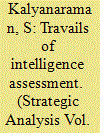

|
|
|
|
|
| Publication |
Jan-Mar 2005.
|
|
|
|
|
|
|
|
|
|
|
|
|
|
|
|